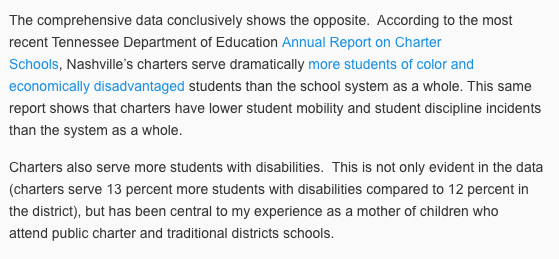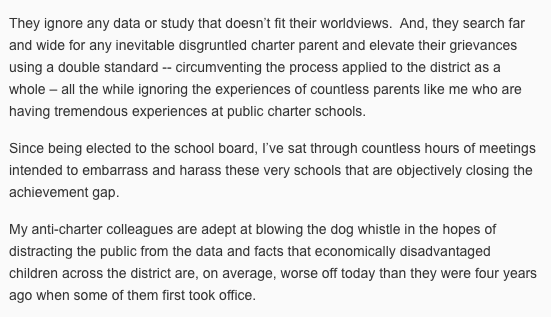MNPS Board Member Amy Frogge talks about the high cost of School Board races, using her own experience of being outspent 5-1 as an example. Here’s her Facebook post on the issue:
When I first ran for school board four years ago, it was the start of a new era for local elections. In prior years, no one paid much attention to school board races, and $15,000 was considered a good haul for a school board candidate. So you can imagine how shocked I was to learn that my opponent had raised $125,000 for our race! She was the highest funded candidate in the history of Nashville’s school board races.
Ultimately, I was able to raise around $25,000 for my own race (which was very difficult for me!). I spent months knocking on neighbor’s doors campaigning. Through hard work and with a lot of help from my friends and unpaid volunteers, I was able to build a strong grassroots campaign that allowed me to overcome the odds. Despite being outspent 5 to 1, I managed to win by a 2 to 1 margin- which just goes to show that money doesn’t always determine the outcome of political races in smaller local elections.
Many candidates in Nashville’s school board races now routinely raise around $80,000 for school board elections. You should ask: Why is so much money being poured into small school board races? What is at stake for the funders of these elections, particularly when the funders do not even have children in our public school system? This eye-opening article explains it well.
Nashville is part of a larger network of cities where school board seats are being bought by outside corporate interests seeking to expand charter schools (and to make money in other ways, such as through for-profit testing). I’ve seen this very clearly at the national conferences I’ve attended, where I learned that the same organizations and funders (often billionaires!) are involved nationwide. School board elections in many major urban cities have turned into high-dollar, contentious events with money flowing in from unlikely sources. This has led to the fracturing of local school boards, which have been divided by outside special interests. (Already, I expect some nasty personal attacks from these outside interests during my campaign this summer.)
Watch our school board races carefully this year. It will become clear from donations who is backed by special interests. Their campaigns will be slick and shiny, run by high-dollar PR firms, and you will likely be impressed by the marketing. But please be wary of these candidates and the agenda their backers are trying to drive for our local schools. It is not about the best interests of children.
[From the article below:
“A network of education advocacy groups, heavily backed by hedge-fund investors, has turned its political attention to the local level, with aspirations to stock school boards — from Indianapolis and Minneapolis to Denver and Los Angeles — with allies. . . . The same big-money donors and organizational names pop up in news reports and campaign-finance filings, revealing the behind-the-scenes coordination across organizational, geographic and industry lines. The origins arguably trace back to Democrats for Education Reform, a relatively obscure group founded by New York hedge funders in the mid-2000s.
The hedge-fund industry and the charter movement are almost inextricably entangled. Executives see charter-school expansion as vital to the future of public education, relying on a model of competition. They see testing as essential to accountability. And they often look at teacher unions with unvarnished distaste. Several hedge-fund managers have launched their own charter-school chains. You’d be hard-pressed to find a hedge-fund guy who doesn’t sit on a charter-school board.”]
Here’s the article she cites from Bill Moyers.
For more on education politics and policy in Tennessee, follow @TNEdReport


